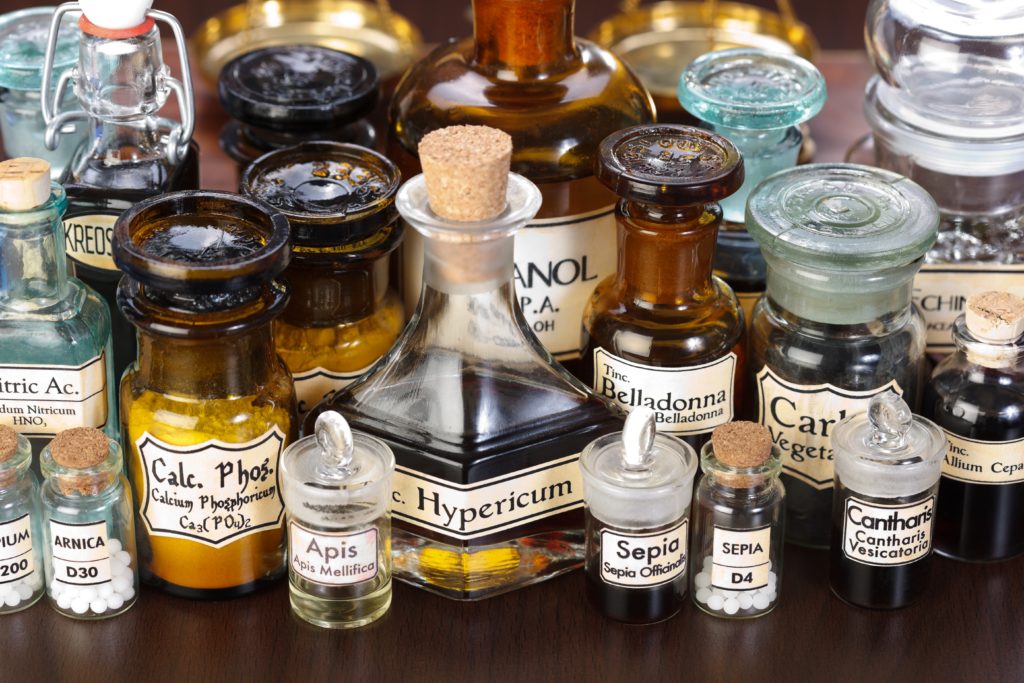I don’t take it for granted that everyone has an understanding of homeopathy, so let’s start at the beginning.
Homeopathy is the practice of compounding small doses of natural substances from plant, animal, or mineral sources into remedies. A fundamental tenet of homeopathy is the “Law of Similars,” meaning a substance that creates a particular reaction can also neutralize and rebalance a similar reaction. There are three specific characteristics that set homeopathy apart from all other methods of health care.
- The completed remedy contains only a tiny amount of the original substance, which carries information.
- The process of manufacture, which includes dilution and succussion (shaking), is unique to homeopathic preparations.
- The correct remedy is determined by a specific method of observation of the symptoms exhibited by the patient.
Homeopathy has been practiced for over 230 years, and the World Health Organization reports that it is the second most widely used primary health care modality in the world:
- 500 million people every year receive homeopathic treatment.
- 5,000 French physicians prescribe homeopathy regularly.
- 21 out of 24 Colleges of Pharmacy in France teach homeopathy.
- The royal family has been under homeopathic care since the 1930s.
- There are over 100 homeopathic medical schools in India.
- In Germany, over 25 percent of family physicians use homeopathy.
An 1866 article in the New England Medical Gazette observed that patients under homeopathic care lived longer, leading some life insurance companies to offer a 10 percent discount to homeopathic patients.
Unfortunately, the medical community in the twenty-first century has strayed far from the use of nontoxic, inexpensive, efficient natural medicines, despite the fact that homeopathy is not associated with any known side effects. Homeopathy is safe for babies, adults, the elderly, and even animals. You can find homeopathic remedies at your local health food store, natural pharmacy, or online.
Food Allergy vs. Sensitivity
Let’s clarify an allergic reaction from a sensitivity. An allergic reaction is one that creates severe, life-threatening symptoms—most commonly referred to as an anaphylactic reaction.
Symptoms of anaphylaxis include:
- Swelling of the mouth and/or throat
- Trouble breathing
- Excessive vomiting and diarrhea
- Severe hives
- Drop in blood pressure
Symptoms of food sensitivity to something you’ve eaten include:
- Bloating/cramping
- Gas
- Acid reflux
- Headache
- Nausea
- Itchy skin
- Brain fog
As you can see, the possible reactions to food sensitivities are not nearly as severe as they are with a food allergy, yet both can be helped with the use of homeopathic remedies. But at this point, you may be asking why these reactions occur in the first place
Food allergies and sensitivities are both an abnormal response to a food triggered by the body’s immune system and almost always the result of a disturbance in body chemistry. The degree of reaction coincides with the degree of disturbance.
It’s been my experience over the years that disturbances arise from specific events or treatments. When my patients recount the onset of their symptoms, I will ask them what was going on at the time. Almost always, they report experiencing an emotional trauma or a physical trauma in the form of pharmaceutical intervention. For children, anaphylaxis usually has to do with a disturbance or deficiency from birth.
The foods that most often trigger allergic reactions in adults include fish, shellfish, peanuts, and tree nuts. Problem foods for children can include eggs, dairy products, peanuts, tree nuts, soy and wheat.
Before we jump into homeopathic remedies that can help with food issues, let’s acknowledge that malnutrition (a lack of critical dietary nutrients) can not only lead to digestive problems such as food intolerances but many other health issues as well. Homeopathic medicine can play an important role in restoring balance and assisting in the healing process. Once you develop these sensitivities and imbalances, your intolerance to substances (foods, pollens, chemicals, etc.) is, at a deeper level, a response to molecules called phenolics.
Phenolics are six-sided chemical rings that are part of basic food molecules. Robert W. Gardner, PhD, a biochemist and professor emeritus of Animal Science at Brigham Young University, discovered phenolics and pioneered research in this field. In his monumental work, Chemical Intolerance: Physiological Causes and Effects and Treatment Modalities, Gardner documents hundreds of trials showing that homeopathic dilutions of phenols are far more effective than allergy shots.
Dr. Gardner discovered that the phenolics attached to protein molecules are the real culprits affecting the immune response, not the food itself. What are valuable nutrients to some create havoc for others, in the form of allergic reaction. These reactions can be due to digestive dysfunction brought on by poor diet; disturbances of body chemistry from pharmaceutical drugs, preservatives and other chemicals; food poisoning, and a number of other causes.
You can read more about the uses of phenolic therapy in my book The Alternative: Your Family’s Guide to Wellness, which includes phenolic charts showing the specific relation between allergy symptoms and the phenol that is responsible. (You can also find this information in my ebook Alternative Medicine for Allergies, Cold, and Flu: Easy to Follow Guide to Fixing Acute and Chronic Conditions.)
Homeopathic Help for Food Allergies and Sensitivities
Let’s begin with the most important issue, anaphylaxis:
APIS MELLIFICA (200C): The most important remedy for a violent reaction. I am not suggesting that anyone experiencing anaphylaxis should avoid getting help. However, administering this remedy as often as every 30 seconds, or as needed, can help stabilize the person until help arrives. Can be used for allergic reaction to beestings, insect bites, hives, hay fever, asthma, and food-induced reactions.
The following remedies can help with discomfort associated with a food intolerance or sensitivity:
- BOVISTA (200C): Works well for gluten sensitivities if taken twice daily for at least three months.
- AETHUSA (200C): For dairy sensitivity, also taken twice daily for an extended period of time. If there is bloating or gas, add Lycopodium (200c) and Arsenicum album (6c) twice daily.
- ARSENICUM ALBUM (6C): Restless, fear about health; drinks little and often, craves cold water or warm tea; stops diarrhea and nausea. Great for food poisoning.
- CARBO VEGETABILIS (30C): When milk, meat, or fats cause flatulence; slow digestion, food putrefies. Belching after eating, which brings temporary relief. Heaviness, fullness, sleepiness. Can have contractive pains extending to chest with distention of abdomen.
- LYCOPODIUM: Weak digestion, noisy flatulence after eating, bloated and full; inactive intestines, fermentation in intestines; feels like there is a band around the waist; good for colic in babies.
- NUX VOMICA (30C): Distress from overeating, hangovers, rich food, hiccoughs; weight and pain in the stomach; sour taste, nausea in the morning after eating, irritable. Can be chilled easily.
- CHELIDONIUM (30C): Gallbladder issues; can have pain from stomach to back to right shoulder blade; gastric pains, better after eating. Can be combined with Nux Vomica for good result.
- NATRUM PHOSPHORICUM (Nat Phos) (30C): For those who suffer from indigestion often and easily. Take after meals as you would a digestive enzyme.
- IPECACUANHA (30C): Nausea, vomiting (works well for morning sickness); nausea not better by vomiting; hiccoughs, retching.
- IRIS VERSICOLOR (200C): Acid reflux; burning of alimentary canal; sour, bitter belching; indigestion, headache. Combines well with Lycopodium.
- PLUMBUM (200C): If your food sensitivities cause constipation or hard stool, take twice daily with Lycopodium.
- ALOE VERA (30C or 200C): If constipation is accompanied by mucus in the stools, take with Lycopodium twice daily.
This is an abbreviated list of the many homeopathic remedies that can help with digestion issues. Consult with a trained homeopath for further information regarding your particular symptoms.
Images from iStock/Epiximages (main), erierika (post).



